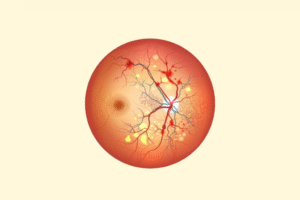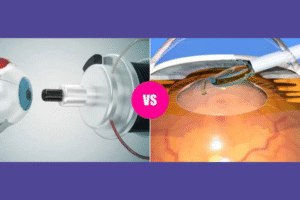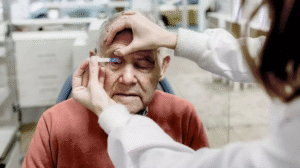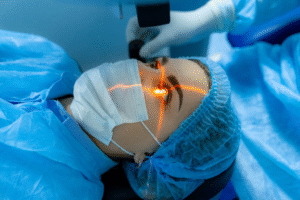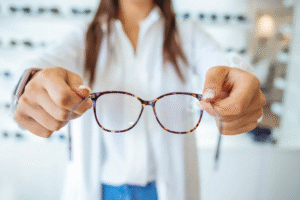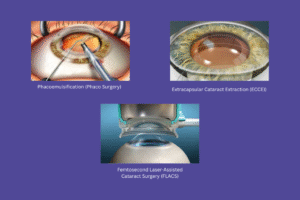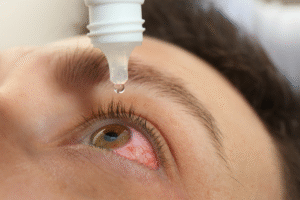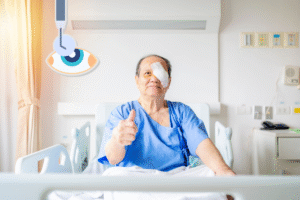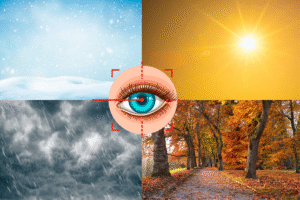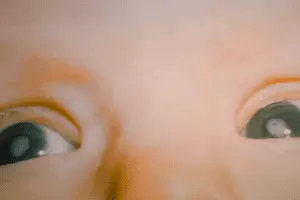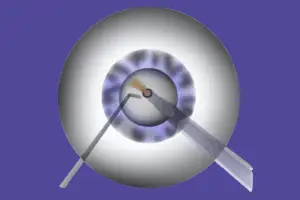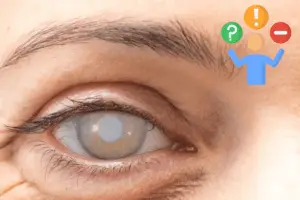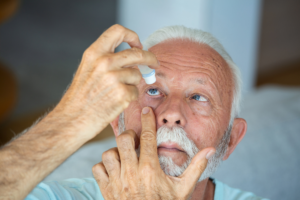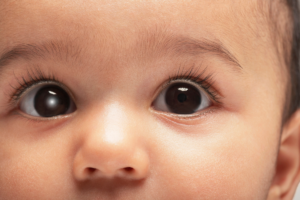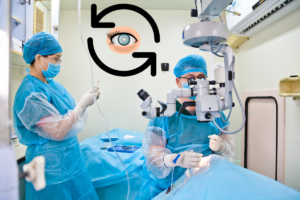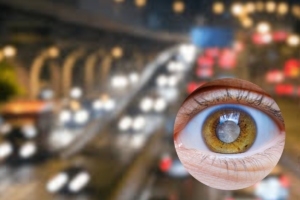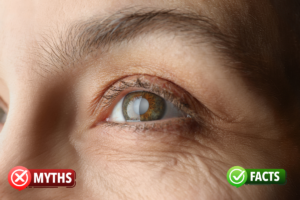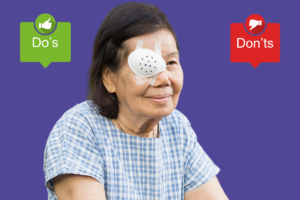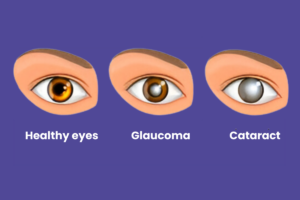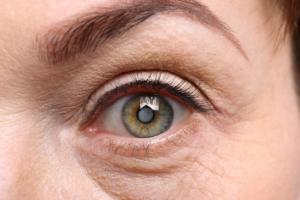How do cataracts affect night vision?
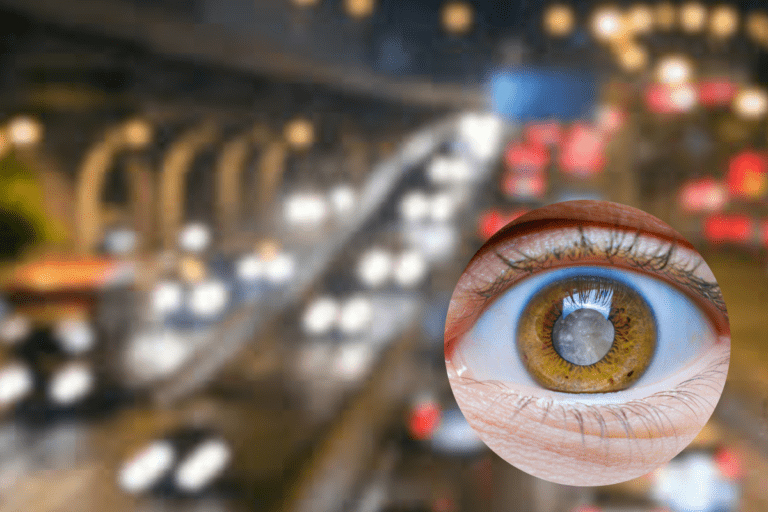
Cataracts are one of the leading causes of vision impairment worldwide, particularly among older adults. They develop when the natural lens of the eye becomes cloudy, impairing light transmission and reducing clarity. One of the most noticeable ways cataracts affect vision is by causing difficulty seeing at night. If you’ve noticed your night vision deteriorating, it could be a sign that a cataract is affecting your eyes.
In this blog, we will explore in detail how cataracts impact night vision and why this happens. Additionally, we’ll discuss how to manage these challenges and the importance of early cataract treatment.
Table of Contents
ToggleWhat are cataracts?
Before delving into how cataracts affect night vision, it’s essential to understand what a cataract is. A cataract occurs when the clear, flexible lens inside the eye becomes cloudy or opaque. The lens helps focus light onto the retina, allowing for clear vision. When it becomes cloudy, it scatters light, causing blurred or distorted vision.
Cataracts typically develop slowly over time, and in the early stages, you may not notice significant changes in your vision. However, as the cataract progresses, it can severely impact various aspects of vision, including the ability to see at night.
What are the symptoms of cataract-induced night vision problems?
Cataracts impact night vision in several ways. The cloudiness in the lens interferes with how light enters the eye, which is especially noticeable in low-light conditions. Here are the primary ways cataracts affect your ability to see at night:
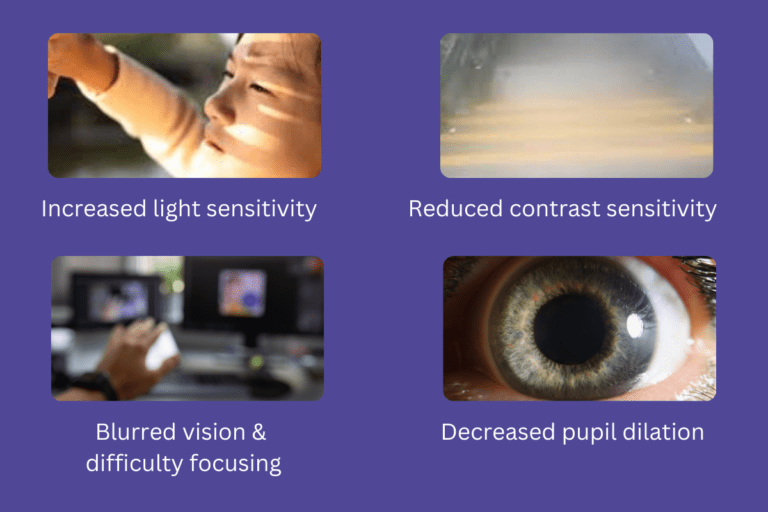
1. Increased light sensitivity
One of the most common symptoms of cataracts is increased sensitivity to light, particularly when driving at night. When a cataract forms, it causes light to scatter as it enters the eye, instead of focusing clearly on the retina. This scattering effect results in glare and halos around light sources, making it difficult to see clearly in low-light environments such as nighttime driving.
- Halos & Glare: When driving at night, you may notice halos around streetlights, headlights, and other bright lights. The glare from these light sources can make it challenging to see clearly, increasing the risk of accidents.
- Difficulty with headlights: Oncoming car headlights, streetlights, and traffic lights can create excessive glare, leading to difficulty adjusting your vision. This makes it harder to navigate roads safely at night.
2. Reduced contrast sensitivity
Contrast sensitivity refers to the ability to distinguish objects from their background, particularly in low-light conditions. People with cataracts often experience a reduction in contrast sensitivity, making it more challenging to see objects in dim lighting or at night.
For example, it becomes more difficult to distinguish between dark road surfaces and obstacles, such as pedestrians, animals, or debris. This loss of contrast can be especially dangerous while driving, as it can impair your ability to react to unexpected changes in your surroundings.
3. Blurred vision & difficulty focusing
As cataracts worsen, they cause more significant blurring of vision, which can be particularly problematic at night. Cataracts cause the lens of the eye to become cloudy, making it harder for light to pass through and focus properly on the retina. This results in blurred vision that is especially noticeable when trying to see in low-light environments.
- Blurry vision in dim lighting: At night, the lack of ambient light makes it even harder for people with cataracts to see clearly. The reduced clarity makes it difficult to identify objects or read street signs, making navigation more challenging.
4. Decreased pupil dilation
The pupil is responsible for controlling the amount of light that enters the eye. In dimly lit environments, such as at night, the pupil dilates to allow more light in. However, cataracts can cause the pupil to become less responsive to changes in light conditions, making it harder to adjust to low-light environments.
- Slower adaptation to darkness: Without proper pupil dilation, the eyes cannot adjust quickly enough to darker environments. This can lead to prolonged periods of poor vision, making it difficult to see when moving from well-lit areas into dimly lit ones.
Why do cataracts cause these issues at night?
The main reason cataracts affect night vision is due to the scattering of light as it passes through the cloudy lens. In a healthy eye, the lens focuses light directly onto the retina, resulting in clear and sharp images. However, when a cataract develops, the clouded lens distorts the light entering the eye, which leads to:
- Glare & Halos: Scattered light leads to glare and halos around light sources, making it harder to focus on them.
- Reduced contrast: The scattering of light also reduces the contrast between objects, especially in low-light settings.
- Blurred vision: As the cataract worsens, the lens becomes increasingly opaque, reducing the amount of light reaching the retina and causing blurred vision.
Common myths & misconceptions about cataracts & night vision
Many people misunderstand the connection between cataracts and night vision. Let’s clear up some common misconceptions:
🛑 Myth #1: Cataracts only cause blurry vision, Not night vision issues
✅ Fact: Cataracts scatter light inside the eye, leading to glare, halos, and poor contrast sensitivity, making night driving particularly difficult.
🛑 Myth #2: Using brighter headlights or glasses can fix night vision problems caused by cataracts
✅ Fact: No amount of brighter lights or stronger glasses can fully correct night vision problems caused by cataracts. Surgery is the only way to restore clear night vision.
🛑 Myth #3: Night vision issues always mean you have cataracts
✅ Fact: While cataracts are a common cause of night vision problems, other conditions like retinal diseases, glaucoma, or vitamin A deficiency can also affect night vision.
🛑 Myth #4: Cataract surgery doesn’t improve night vision
✅ Fact: Modern intraocular lenses (IOLs) not only restore clarity but can also reduce glare and halos, significantly improving night vision.
🛑 Myth #5: Yellow-tinted glasses can fully solve cataract-related night vision problems
✅ Fact: While yellow-tinted lenses may slightly reduce glare, they don’t address the root cause—the clouding of the natural lens due to cataracts.
By understanding these myths, you can take proactive steps to maintain safe and clear night vision.
How to manage cataract-induced night vision problems?
While cataract surgery is the most effective treatment for restoring vision, there are several steps you can take to manage the challenges of night vision until you’re able to undergo surgery:
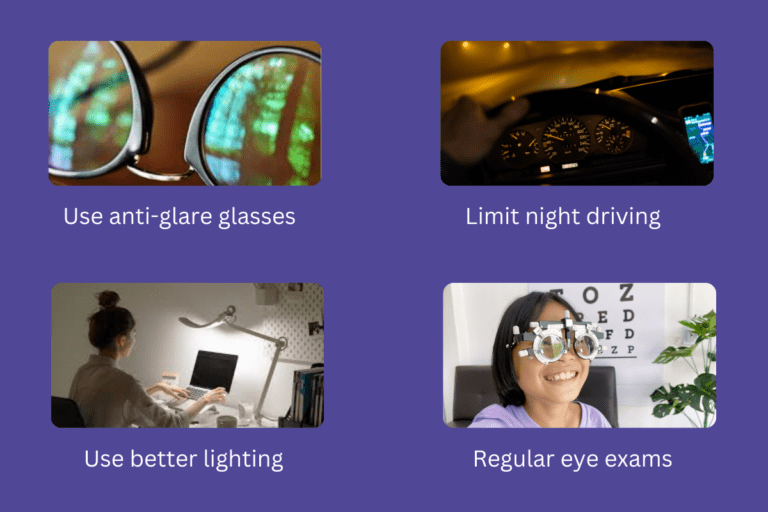
1. Use anti-glare glasses
Wearing glasses with an anti-glare coating can help reduce the glare from headlights and street lights at night. These glasses can help you feel more comfortable while driving at night or in low-light conditions.
2. Limit night driving
If you are experiencing significant difficulty with night vision due to cataracts, it’s a good idea to limit driving at night, particularly on unfamiliar roads or highways. If driving is necessary, ensure that you are well-rested and take extra precautions to drive more slowly and carefully.
3. Use better lighting
At home, you can use brighter, softer lighting to help reduce the contrast between dark areas and objects. Using task lighting for activities like reading can also help you see more clearly in low-light situations.
4. Regular eye exams
Scheduling regular eye exams with an ophthalmologist is crucial for detecting cataracts early on. By monitoring the progression of cataracts, you can ensure that you’re taking appropriate steps to maintain your vision.
When should you consider cataract surgery?
Cataract surgery is the only definitive solution to restore vision once cataracts begin to significantly impair daily activities, including night vision. Cataract surgery involves removing the cloudy lens and replacing it with a clear artificial lens (intraocular lens, or IOL). The procedure is highly effective, safe, and has a short recovery time.
If your night vision is becoming increasingly difficult to manage, or if cataracts are interfering with other aspects of your daily life, it may be time to consult an eye specialist about cataract surgery. Early treatment can help prevent further vision loss and improve your quality of life.
Addressing night vision challenges post-cataract surgery
While cataract surgery significantly improves vision, some patients may still experience night vision challenges due to the following reasons:
1. Temporary light sensitivity & glare
It’s common to experience increased glare and halos around lights immediately after surgery. This usually improves within a few weeks as the eyes adjust to the new intraocular lens (IOL).
2. Type of Intraocular Lens (IOL) used
- Monofocal IOLs: Provide clear vision at one distance (near or far), but may require glasses for optimal night vision.
- Multifocal IOLs: Can cause halos and glare at night due to light distribution across multiple focal points.
- Toric IOLs (for astigmatism): May slightly alter how light is processed at night, requiring an adjustment period.
- Extended Depth of Focus (EDOF) IOLs: Provide a continuous range of vision from far to intermediate, reducing halos and glare compared to multifocal IOLs. However, they may still cause mild contrast sensitivity issues in very low-light conditions.
3. Dry eyes & Night vision dsturbances
Dry eye syndrome is common after cataract surgery and can cause blurry vision and halos at night. Using preservative-free artificial tears can help improve clarity.
4. Residual refractive errors
Some patients may have minor uncorrected refractive errors (like astigmatism) after surgery, which can contribute to night vision issues. Glasses or minor laser enhancements may be needed for fine-tuning.
5. Adjusting to new vision
The brain needs time to adapt to the new lens. Night vision typically improves within a few weeks to months post-surgery as the brain and eyes adjust.
Tips to improve night vision after cataract surgery
- Wear anti-glare glasses when driving at night.
- Use adequate lighting at home and avoid direct exposure to bright lights.
- Follow post-surgery care instructions and attend follow-up visits.
- Manage dry eyes with lubricating eye drops.
- Allow time for adaptation—most issues improve as your eyes heal.
If night vision problems persist beyond three to six months, consult your ophthalmologist to rule out underlying issues like residual astigmatism, posterior capsule opacification (PCO), or other eye conditions.
Conclusion
Cataracts can severely affect night vision, leading to increased glare, reduced contrast sensitivity, blurred vision, and difficulty adjusting to low-light conditions. These changes can make nighttime activities, such as driving, much more challenging and dangerous. While cataracts worsen over time, early diagnosis and treatment can significantly reduce the impact on your night vision and overall quality of life.
At Krisha Eye Hospital, we specialize in cataract diagnosis and surgery. If you’re experiencing difficulties with your night vision or have been diagnosed with cataracts, we are here to provide personalized care and help you regain clear, comfortable vision. Contact us today to schedule an appointment and take the first step toward restoring your eyesight.
Author bio
Dr. Dhwani Maheshwari, an esteemed ophthalmologist with over 10 years of experience, leads Krisha Eye hospital in Ahmedabad with a commitment to advanced, patient-centered eye care. Specializing in cataract and refractive surgery, Dr. Maheshwari has performed more than a thousand successful surgeries. Her expertise lies in phacoemulsification, a technique recognized for its precision in cataract treatment.
Dr. Maheshwari’s educational journey includes an MBBS from Smt. NHL MMC, a DOMS from M & J Institute of Ophthalmology, and a DNB in Ophthalmology from Mahatme Eye Bank Eye Hospital, Nagpur. She also completed a fellowship in phacoemulsification at Porecha Blindness Trust Hospital, further enhancing her surgical skills. In addition to her work at Krisha Eye Hospital, Dr. Maheshwari serves as a consultant ophthalmologist at Northstar Diagnostic Centre.
Under her leadership, Krisha Eye Hospital aims to bring all superspecialties under one roof, offering comprehensive eye care solutions for all vision needs.
FAQs
Yes, cataracts can significantly impair your ability to see at night. They cause the lens of the eye to become cloudy, which scatters light entering the eye and makes it difficult to focus. This results in symptoms like glare, halos around lights, and blurred vision, especially in low-light conditions.
Halos around lights at night are a common symptom of cataracts. The clouded lens scatters the light that enters the eye, causing it to disperse and form halos around light sources such as streetlights, car headlights, or street signs. This can create visual distortion and make it difficult to see clearly.
Cataracts can make night driving challenging due to increased glare from headlights, streetlights, and other light sources. This can reduce contrast sensitivity and blur your vision, making it difficult to see objects and road signs clearly. The clouded lens scatters light, making it harder for your eyes to focus in low-light conditions, thus increasing the risk of accidents.
Driving at night with cataracts can be dangerous due to the glare and halos around lights, reduced contrast sensitivity, and blurred vision. If you notice difficulty seeing at night or while driving, it’s important to talk to your eye doctor, who may recommend cataract surgery for improved vision and safety.
Yes, cataract surgery can significantly improve night vision. During the surgery, the clouded natural lens is replaced with a clear artificial lens (intraocular lens or IOL). This restoration of clarity allows light to focus correctly on the retina, reducing glare, improving contrast sensitivity, and providing sharper vision in low-light environments.
If you’re experiencing difficulty seeing at night due to cataracts, there are several ways to manage the symptoms:
- Use anti-glare glasses to reduce the impact of light sources.
- Limit night driving to reduce the risk of accidents.
- Use brighter and softer lighting at home to improve visibility.
- Get regular eye exams to monitor the cataract’s progression.
Yes, cataracts tend to worsen over time. As they progress, the cloudiness of the lens increases, leading to more significant problems with vision, especially in low-light situations. Early treatment and timely cataract surgery can help prevent further deterioration of your vision.
While cataract surgery is the most effective solution, lifestyle changes can help manage symptoms in the interim:
- Limit exposure to bright lights during the day to reduce sensitivity to light.
- Use brighter lighting at home for tasks like reading or cooking.
- Take breaks from night driving to avoid accidents.
Yes, cataracts can affect daytime vision as well. They can cause blurry vision, difficulty with contrast sensitivity, and reduced clarity, making it challenging to see in both bright and low-light conditions. Cataracts tend to cause more noticeable symptoms as they progress.
Yes, cataracts can increase light sensitivity (photophobia), making headlights, streetlights, and oncoming traffic lights seem overly bright or blinding. This is due to the lens scattering light inside the eye, leading to discomfort and difficulty seeing clearly at night.
Cataracts reduce contrast and color perception, making objects appear washed out, especially in low-light conditions. This can make it harder to differentiate between similar colors or see road signs clearly at night.
No, different types of cataracts affect night vision differently. Nuclear cataracts often cause increased glare and difficulty seeing in dim light, while posterior subcapsular cataracts can cause severe glare and halos around lights, especially at night.
No, while some eye drops claim to delay cataract progression, they cannot reverse cataract-related night vision problems. The only effective treatment is cataract surgery.
Cataracts are a common cause, but other conditions like glaucoma, diabetic retinopathy, macular degeneration, or vitamin A deficiency can also impact night vision. An eye doctor can perform tests to determine the exact cause.



